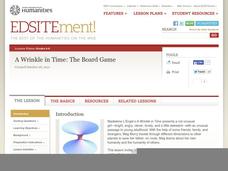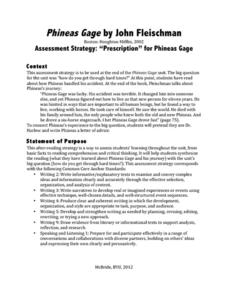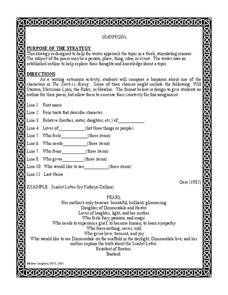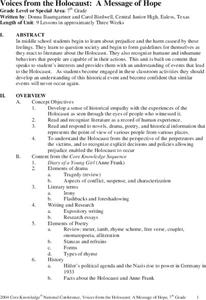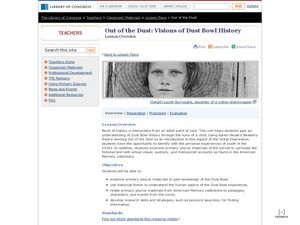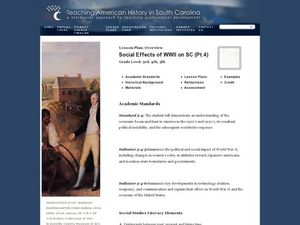Children's Museum of Indianapolis
Anne Frank: Facing Hatred, Daring to Dream
The stories of Anne Frank, Ruby Bridges, and Ryan White illustrate the power of children to make a difference. The three lesson in this must-have resource are designed to inspire young people to make a difference in their world....
Curated OER
An Interdisciplinary Approach to Learning with Walt Whitman
Use poetry as a mode for creating interest and cross discipline learning.
National Endowment for the Humanities
A Wrinkle in Time: The Board Game
Tackle some big questions about A Wrinkle in Time by Madeleine L'Engle with a board game project. As learners brainstorm for and complete their board games, they consider what helps and hinders Meg on her journey and why she succeeds in...
Curated OER
Phineas Gage: Assessment Strategy
Close up your study of Phineas Gage: A Gruesome but True Story About Brain Science with a letter-writing assignment. Pupils prepare by journaling and sharing with a partner. They then compose letters that focus on a big idea from the...
Curated OER
Applying Ahimsa to Traditional Stories
Investigate the life of Mahatma Gandhi by researching non-violent lifestyles. Learners define the word ahimsa and discuss the personal characteristics that made Gandhi a peaceful warrior. They also create a poster about the story "The...
Curated OER
Maurice Sendak's Books: More Relevant and Rigorous than Ever
Nearly 50 years after publication, Sendak's Where the Wild Things Are holds up to the Common Core.
Shoop English
Literature Terms Activity
Designed to be used with an independent reading book, this activity provides practice with identifying and explaining literary terms. While they read, individuals find instances of literary devices and elements in use in their books....
Novelinks
The Dark Is Rising: Biopoem
How well do your learners really know the characters in Susan Cooper's The Dark is Rising? A biopoem activity prompts readers to investigate the characters and their traits. Line by line, writers add the characters' relatives,...
Curated OER
Voices from the Holocaust: A Message of Hope
Students develop a sense of historical empathy as they discuss The Holocaust and roll play activities designed to highlight prejudice in today's society. In this Holocaust history and The Diary of Anne Frank lesson, students...
Curated OER
"Et tu, Brute?" - The Characters, Conflict and Historical context of Shakespeare's Julius Caesar
Students analyze the Shakespearian play, "Julius Caesar" in this seven lesson unit. Through readings, hands-on projects, and the study of plot development, comparisons are made to the movie and the historical records available.
Curated OER
The Stinky Cheese Man and Other Fairly Stupid Tales
Sixth graders demonstrate the ability to process and evaluate content from a variety of sources and apply comprehension skills to the material read. They organize information for practical use and design and develop an informational...
Curated OER
The House on Mango Street: Book Review
In this set of worksheets on The House on Mango Street, students complete 8 total worksheets; each consists of a set of short answer questions followed by an essay assignment.
Curated OER
Respecting Nonreligious People
Help students understand what an atheist is and why it is important or respect their beliefs. Using this non believers lesson, students will learn about people who hold different beliefs are discriminated against by others. They will...
Curated OER
Out of the Dust: Visions of Dust Bowl History Lesson Overview
Students complete activities with the book Out of the Dust by Karen Hesse. In this literature lesson, students read this story and view the Dust Bowl history from the eyes of a child. They discover the Great Depression and life in the...
Curated OER
The Lion, The Witch, and The Wardrobe: A Literature Evaluation Project
Sixth graders read and analyze The Lion, The Witch, and The Wardrobe. They study the elements of literature found in the book. Students create an elements of literature flip book that shows the various elements of literature in the novel.
Curated OER
Evergreen's Green Team Energy Audit
Students investigate the ways energy is used at their school and how it can be changed. In this energy lesson, students participate in a service project related to energy. Students record and calculate changes that saved energy and the...
Curated OER
The Wright Brothers
In this online interactive Wright brothers worksheet, students respond to 8 fill in the blank and multiple choice questions regarding the information included in the provided paragraphs.
Curated OER
Social Effects of WWII on South Carolina
Young scholars study the history of South Carolina and the impact World War II had on the state. In this WWII history lesson, students research the social effects incurred from WWII on the people of South Carolina. Young scholars develop...
Curated OER
Brothers in Hope
Young scholars demonstrate their understanding of a book read in class. In this reading comprehension instructional activity, students participate in a process drama led by their teacher in order to demonstrate their understanding of the...
Curated OER
Combining Geography and Literature by Mapping a Story
Students listen to or read a story on their own. Using the text, they describe the relative locations of the main events. In groups, they develop two and three dimensional maps of the story. They create a key and a title for their map.




